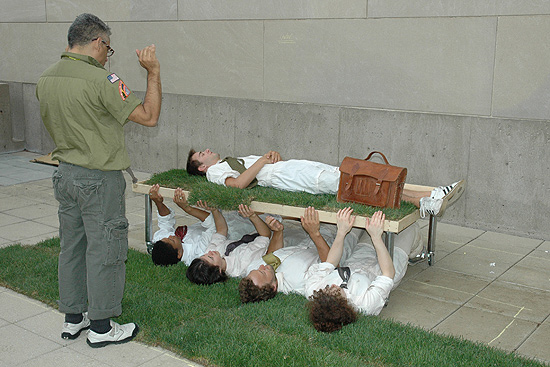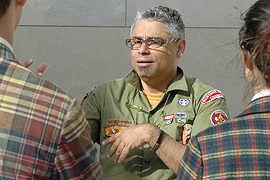Dance Professor Investigates ‘Softness’ as an Eco-Aesthetic Principle in Choreography, Research
 |
| Pedro Alejandro, chair of the Dance Department, associate professor of dance, works with students for the production No Eggshells/ Outside, which premiers at 8 p.m. May 5 and 6 on the CFA Terrace. Alejandro is choreographing the performance. |
| Posted 05/01/08 |
| For two days, Pedro Alejandro will convert the Center for the Arts concrete- and limestone-walled terrace into a green, grassy soft space.
Alejandro explores the theme of eco-aesthetics in an upcoming performance titled No Eggshells/ Outside. The performance begins at 8 p.m. May 5 and 6 on the Center for the Arts Terrace (Rain date May 8). All participants are volunteers from the dance, theater and music departments.
In this performance, we are establishing a relationship to the principle of softness in nature. We focus on eggs as a metaphor because they have a hard outer shell and a soft, interior that carries the potential for life, Alejandro explains. We use grass to soften the hard concrete to recreate the power of that metaphor and conjure the yielding principles that allow natural forms to enter our imaginary. And the dancers movements explore the physical and psychic experience of arriving at softness through their own unleashed animality. Everything from the terraces grounds, walls and stair railings will be lined with grass. Marcela Oteiza, adjunct assistant professor of theater, will be creating a live video feed during the performance that brings other sites where the dancers have worked into this performance. This summer, as a recipient of a Mellon Summer Research grant, Alejandro will continue to research the ecological theme in the Dominican Republic with a project titled Thunderous Light. With the assistance the Dominican Blind Association, he has worked with blind musicians, Luz Del Sonido (Sound of Light), to develop a movement curriculum that extends the meta-kinectic capabilities of these blind performers. The Thunderous Light project will use of piston/friction floor technology developed to make electricity from the dancing of human bodies. Piston technology has been used effectively to recycle energy vibration from moving bodies and generate off-the-grid electricity in Rotterdam by the Dutch architectural firm of Henk Döll and Enviu, innovators on sustainability. He hopes the movements will attract a diverse audience, including sociologists, scientists and robotic engineers. The emphasis in that project is on the civic performance of the bodys energy as a social regulating mechanism directed at the inefficiency of capital accumulation in articulating ecological desires, Alejandro explains. In harnessing the energy derived from moving bodies, and blind dancing bodies to be exact in this example, the Dominican cultural body in performance is invited to enact civic ecological preoccupations that link cultural production with economic development. Like No Eggshells, Alejandro will investigate the productive uses of human energy and animality to generate eco-aesthetic wealth in the political economy of softness. He hopes Thunderous Light will stimulate inter-disciplinary study and discussions about the conversion of bodily energy into ecologically useful technology. He also hopes the work will highlight connections between dance studies, architecture, and regional planning in the Caribbean and worldwide. This work has evolved into an ethnographic and historical investigation into the ecology of modernity as both a symbolic activity and a cultural practice, through the lenses of dance, he explains. In addition to kicking off this year-long performance project that has been in the making for five years, in the Dominican Republic, Alejandro and two student research assistants, Brittany Delany 09 and Antonia Craige ’09, will conduct archival research on two prominent Dominican dance anthropologists at the National Archives in the Caribbean. The students also will conduct site-specific research on the cultural performance of Caribbean ecologism and traditions. “I can think of no other professor/scholar/artist/performer/writer/ethnographer/creative force who makes our campus move as well other than Pedro,” says Delany. “He actively practices an enthusiasm for life, people, animals, art, nature. Hes down-to-earth, radical, funny, and real, and his ability to articulate tough concepts and intersecting components calls for the sophisticated student body Wesleyan encourages.” Through the continuation of this research, Alejandro hopes to develop a environmental performance course titled Caribbean Performance and Ecologism, where students and faculty of various disciplines would participate in research and study of Caribbean cultural practices and ecologism. By combining environmental studies, economics, dance, music, history, and language studies, students would be immersed in cultural communities and agencies that enhance the deep understanding of Caribbean consciousness and ecologically sustainable cultural production, he explains. |
| By Olivia Drake, The Wesleyan Connection editor |


 No Eggshells/ Outside is an experimental performance relating to Alejandros research interests on sustainability, the political economy of softness of Modern Dances conceptual apparatus; and the relationship between the animalistic and spiritual components in the meta-kinetic development of dancers.
No Eggshells/ Outside is an experimental performance relating to Alejandros research interests on sustainability, the political economy of softness of Modern Dances conceptual apparatus; and the relationship between the animalistic and spiritual components in the meta-kinetic development of dancers.